“I try to approach music photography in the mindset of a superfan,” says Pooneh Ghana. The Los Angeles-based photographer, 32, has been documenting the live music scene since she was a teenager.
Her specialty is capturing musicians on stage in front of sweaty faces pouring over stage barriers – and also intimate candids of them on the road between shows. It is more interesting that way, she says.
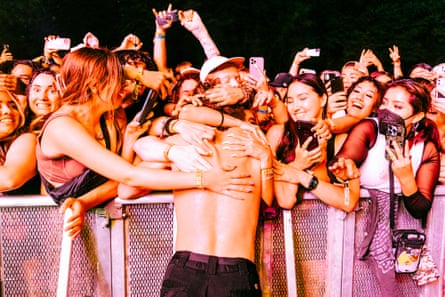
She has gone on tour with some of the biggest names in indie rock – Fontaines DC, Idles, Cage the Elephant, Courtney Barnett, Sunflower Bean and Shame as well as 2021’s breakout pop star Olivia Rodrigo. She’s shot Travis Scott, Billie Eilish and Dua Lipa, to name just a few.
Ghana started her career documenting the indie sleaze era in 2008 as an emerging photographer. As her career reached new heights, she found the world she worked in on pause – so she turned her lens to document the Black Lives Matter protests and the marquees of venues shuttered by the pandemic: “We’ll be back soon.” Now she is taking note of live music’s attempt at a comeback after the long Covid silence, with her unique behind-the-scenes position giving her insight to the burnout musicians are experiencing.
“Touring has really taken its toll on everyone. I hope that bands can find a more sustainable way to do what they love and the fans don’t have to pay $100 a ticket to go see these artists because ultimately it affects each other,” she says.
She notices musicians facing increased financial pressure from a broken industry. “It’s crazy – you hear about how basically if you’re not selling out a 3,000-, 4,000-capacity room tonight, you’re not even breaking even on tour. Hearing how much bands are struggling has been really tough.
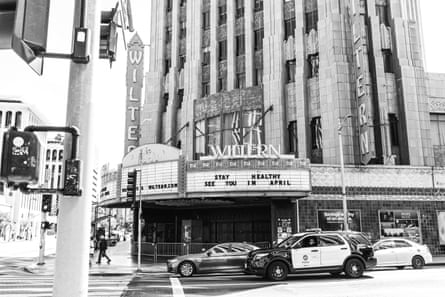
“Obviously there’s something broken in the system when bands are not only unable to afford to live, but they’re also canceling shows because they’re being pushed so hard,” she says.
As touring musicians have taken a hit, so have the photographers who rely on them for work. “None of us predicted it, so I think we’re all just really tired, but really grateful for things to be kind of back at the extent they are.”

The first live music Ghana shot in 2020 was two days before the year ended: two nights of livestreamed performances featuring Black Pumas and Maggie Rogers at the Wiltern. “It was a full production performance to no one, but they needed live shots,” says Ghana. “Looking back and seeing an empty theater was so jarring.”
In early 2021, Ghana shot a cover photo of a pregnant Juliette Jackson for the Big Moon’s recent album Here Is Everything. She traveled to meet Jackson in London when the world was still reeling from the pandemic. Covid compliance required an extra level of planning – double vaccinations and two weeks of quarantining.

“The first tour I did back [after Covid protocols were lifted in late 2021] was six weeks with Idles. Idles shows are crazy. People were wearing masks, but for the most part people were just kind of letting loose. It was chaos, the guys are going into the crowd all the time. But within those six weeks nobody got Covid, miraculously.
“Then I did another tour a few months down the road where it was like a strict Covid bubble and nobody was allowed to leave and it ended up getting canceled the last week and a half because somebody tested positive.”
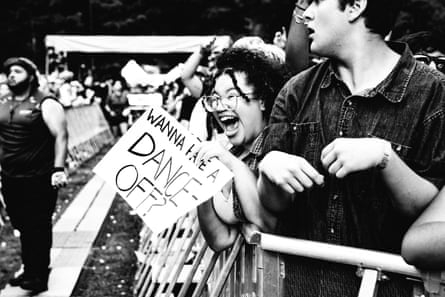
The diminished number of live music photographers and tour crew members who managed to get through the financial dry spell have faced a surge of live shows in 2022 – bands are trying to make up for lost opportunities and newer acts are vying for a shot. It’s been a busy year for Ghana, who now approaches her work with a new sensibility.
“I’ve started to pay attention to the environment more, especially post-Covid. It’s just so fascinating looking at what the crowds are like and how the crowds react to being at a show or you know, the lead singer spitting beer into the crowd.”
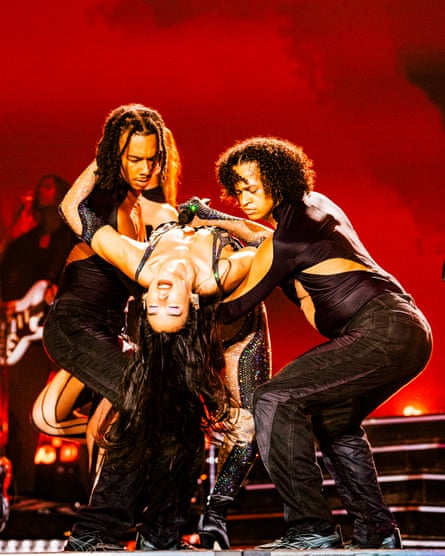
Born to Iranian immigrants, Ghana grew up in San Antonio, Texas and went to concerts in Austin in middle and high school. “It started with me going to shows and wanting to get a photo with the artists. Then I thought: ‘What if I eliminate myself from the photo and just shoot them?’” She started sharing her images on Flickr for fun.
“The pivotal scene in my life that made me realize, ‘Oh, this is what it means to have music change your life’ – for lack of a better term, that whole Indie Sleaze era with the Strokes and the Yeah Yeah Yeahs, the Arctic Monkeys, every band that I discovered that were adjacent to them.”
When her early Polaroids of Kings of Leon blew up on Flickr, Ghana got her first taste of going viral. Now, she often shares her vibrant, energetic images to her 79,000 followers on Instagram. “Ultimately I want people to feel like they’re there,” she says. To this day, her genuine enthusiasm for live music makes her a relatable presence online. If the hundreds of comments on any given post indicate, that enthusiasm is contagious.
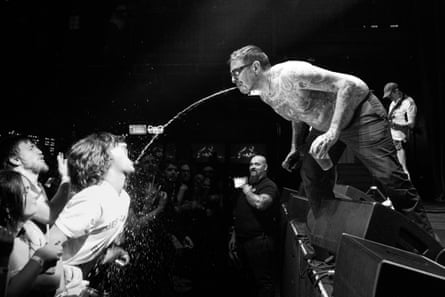
When Ghana started out, she took every opportunity that came her way. She credits her success to a combination of perseverance, focus, a love for music, and the support of friends and loved ones. “There are millions of photographers out there and I am beyond grateful that I was able to get where I am today. I can’t imagine what it’s like trying to start being a photographer now, in an age where it’s so easy to share your work, but in the same way, it’s so hard for it to get seen and to make a profit from it,” she says.
She is cautiously optimistic about the future and hopes artists and their crews will find a way to persevere, despite the uphill battle. “The music scene is such a community where everyone from the sound engineers to the photographers to the fans to the managers are all in this ecosystem that is fragile, but there’s also a support system through it.”
